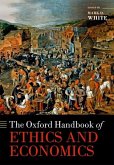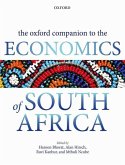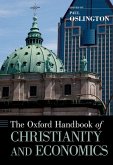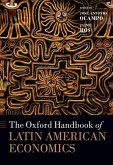Oxford Handbook of Public Choice, Volume 1
Herausgeber: Congleton, Roger D; Voigt, Stefan; Grofman, Bernard N
Oxford Handbook of Public Choice, Volume 1
Herausgeber: Congleton, Roger D; Voigt, Stefan; Grofman, Bernard N
- Gebundenes Buch
- Merkliste
- Auf die Merkliste
- Bewerten Bewerten
- Teilen
- Produkt teilen
- Produkterinnerung
- Produkterinnerung
The Oxford Handbook of Public Choice provides a comprehensive overview of the research in economics, political science, law, and sociology that has generated considerable insight into the politics of democratic and authoritarian systems.
Andere Kunden interessierten sich auch für
![The Oxford Handbook of the Malawi Economy The Oxford Handbook of the Malawi Economy]() The Oxford Handbook of the Malawi Economy195,99 €
The Oxford Handbook of the Malawi Economy195,99 €![Choice, Contract, and Constitutions Choice, Contract, and Constitutions]() James M. BuchananChoice, Contract, and Constitutions25,99 €
James M. BuchananChoice, Contract, and Constitutions25,99 €![The Oxford Handbook of Ethics and Economics The Oxford Handbook of Ethics and Economics]() The Oxford Handbook of Ethics and Economics217,99 €
The Oxford Handbook of Ethics and Economics217,99 €![The Oxford Companion to the Economics of South Africa The Oxford Companion to the Economics of South Africa]() The Oxford Companion to the Economics of South Africa160,99 €
The Oxford Companion to the Economics of South Africa160,99 €![The Oxford Handbook of Banking The Oxford Handbook of Banking]() The Oxford Handbook of Banking251,99 €
The Oxford Handbook of Banking251,99 €![Oxford Handbook of Christianity and Economics Oxford Handbook of Christianity and Economics]() Oxford Handbook of Christianity and Economics230,99 €
Oxford Handbook of Christianity and Economics230,99 €![The Oxford Handbook of Latin American Economics The Oxford Handbook of Latin American Economics]() The Oxford Handbook of Latin American Economics212,99 €
The Oxford Handbook of Latin American Economics212,99 €-
-
-
The Oxford Handbook of Public Choice provides a comprehensive overview of the research in economics, political science, law, and sociology that has generated considerable insight into the politics of democratic and authoritarian systems.
Hinweis: Dieser Artikel kann nur an eine deutsche Lieferadresse ausgeliefert werden.
Hinweis: Dieser Artikel kann nur an eine deutsche Lieferadresse ausgeliefert werden.
Produktdetails
- Produktdetails
- Verlag: Oxford University Press
- Seitenzahl: 984
- Erscheinungstermin: 17. Januar 2019
- Englisch
- Abmessung: 254mm x 182mm x 66mm
- Gewicht: 1741g
- ISBN-13: 9780190469733
- ISBN-10: 0190469730
- Artikelnr.: 52712787
- Herstellerkennzeichnung
- Libri GmbH
- Europaallee 1
- 36244 Bad Hersfeld
- gpsr@libri.de
- Verlag: Oxford University Press
- Seitenzahl: 984
- Erscheinungstermin: 17. Januar 2019
- Englisch
- Abmessung: 254mm x 182mm x 66mm
- Gewicht: 1741g
- ISBN-13: 9780190469733
- ISBN-10: 0190469730
- Artikelnr.: 52712787
- Herstellerkennzeichnung
- Libri GmbH
- Europaallee 1
- 36244 Bad Hersfeld
- gpsr@libri.de
Roger D. Congleton is the BB&T Professor of Economics at West Virginia University. He is coeditor of the journal, Constitutional Political Economy , and has publishing well over a hundred fifty articles on public choice related topics in journals and academic books. Professor Congleton also served as president of the Public Choice Society from March 2018 through March 2020. Bernard Grofman is the Jack W. Peltason Chair of Democracy Studies and Professor of Political Science, University of California, Irvine Stefan Voigt is professor of Law & Economics at the University of Hamburg in Germany. He is best known for his research in constitutional political economy. Together with Roger Congleton, he is editor of the journal, Constitutional Political Economy
* PART I: Introductory Essays
* 1. Rational Choice and Politics: An Introduction to the Research
Program and Methodology of Public Choice
* Roger D. Congleton
* 2. Choosing among Governments
* Alan Hamlin
* 3. Public Choice: Early Contributions
* Dennis C. Mueller
* PART II: VOTING AND ELECTIONS
* A. Modelling Collective Choice in Voting
* 4. From Paired Comparisons and Cycles to Arrow's Theorem
* Donald G. Saari
* 5. Institution-induced Stability
* Kenneth A. Shepsle
* 6. Voting Power
* Stefan Napel
* 7. Aggregation of Information by Binary Voting Rules
* Shmuel Nitzan and Jacob Paroush
* B. Spatial Voting Models
* 8. Political Choices in One Dimension: Theory
* Bernard Grofman
* 9. Political Choices in One Dimension: Applications
* Bernard Grofman
* 10. Spatial Voting Models of Party Competition in Two Dimensions
* James F. Adams
* 11. Spatial Social Choice
* Norman Schofield
* C. Other Aspects of Voter and Party Choice
* 12. Economic Voting
* Michael S. Lewis-Beck and Mary Stegmaier
* 13. Valence Politics
* Haldun Evrenk
* 14. The Study of Strategic Voting
* André Blais and Arianna Degan
* 15. Turnout: Why do voters vote?
* Serguei Kaniovski
* 16. Expressive Voting
* Alan Hamlin and Colin Jennings
* 17. Altruism and Political Participation
* Richard Jankowski
* 18. Social Embeddedness and Rational Turnout
* Carole Jean Uhlaner
* 19. Information cues and rational ignorance
* Shaun Bowler and Stephen P. Nicholson
* 20. Manipulation
* Charles R. Plott
* D. Democracy in Practice
* 21. Campaign Finance
* Thomas Stratmann
* 22. Primaries, conventions, and other methods for nominating
candidates: How do they matter?
* Gilles Serra
* 23. Logrolling and Coalitions
* Anthony J. McGann
* PART III: INTEREST GROUP POLITICS AND RENT SEEKING
* A. Interest Group Politics
* 24. Collective Action
* Jac C. Heckelman
* 25. Rent seeking: The social cost of contestable benefits
* Arye L. Hillman and Ngo Van Long
* 26. The Structure of Contests and the Extent of Dissipation
* Karl Wärneryd
* 27. The Political Economy of Rent Creation and Rent Extraction
* Roger D. Congleton
* 28. Empirical evidence on rent seeking costs
* Ignacio Del Rosal
* B. Political Agency Problems and Trust in Government
* 29. 'The Bureaucracy' as an Interest Group
* Patrick Dunleavy
* 30. Interest Groups and Regulatory Capture
* William F. Shughart II and Diana W. Thomas
* 31. Corruption
* Toke Aidt
* 32. The Political Economy of Trust
* Christian Bjørnskov
* C. Persuasion
* 33. Contested Political Persuasion
* Stergios Skaperdas and Samarth Vaidya
* 34. Stochastic Process Models of Preference Change
* Michel Regenwetter and Yung-Fong Hsu
* 35. Leadership as Persuasion
* Benjamin E. Hermalin
* PART IV: NORMATIVE POLITICAL THEORY: EVALUATING POLICIES AND POLITIES
* 36. Fairness Concepts
* Christian Klamler
* 37. Social Contract vs. Invisible Hand: Agreeing to Solve Social
Dilemmas
* Viktor J. Vanberg
* 38. Utilitarianism as a Criterion for State Action
* Nicolaus Tideman and Florenz Plassmann
* 39. Public Choice and Happiness
* Bruno Frey and Alois Stutzer
* 40. Kantianism and Political Institutions
* Geoffrey Brennan and Hartmut Kliemt
* 41. Public choice and libertarianism
* Peter J. Boettke and Ennio E. Piano
* 42. Public choice and social democracy
* Peter Kurrild-Klitgaard
* 43. Supreme Values, Totalitarianism and Terrorism
* Peter Bernholz
* 44. Fair Division in Dispute Resolution
* Steven J. Brams
* 45. Fair Division in Allocating Cabinet Ministries
* Steven J. Brams
* 1. Rational Choice and Politics: An Introduction to the Research
Program and Methodology of Public Choice
* Roger D. Congleton
* 2. Choosing among Governments
* Alan Hamlin
* 3. Public Choice: Early Contributions
* Dennis C. Mueller
* PART II: VOTING AND ELECTIONS
* A. Modelling Collective Choice in Voting
* 4. From Paired Comparisons and Cycles to Arrow's Theorem
* Donald G. Saari
* 5. Institution-induced Stability
* Kenneth A. Shepsle
* 6. Voting Power
* Stefan Napel
* 7. Aggregation of Information by Binary Voting Rules
* Shmuel Nitzan and Jacob Paroush
* B. Spatial Voting Models
* 8. Political Choices in One Dimension: Theory
* Bernard Grofman
* 9. Political Choices in One Dimension: Applications
* Bernard Grofman
* 10. Spatial Voting Models of Party Competition in Two Dimensions
* James F. Adams
* 11. Spatial Social Choice
* Norman Schofield
* C. Other Aspects of Voter and Party Choice
* 12. Economic Voting
* Michael S. Lewis-Beck and Mary Stegmaier
* 13. Valence Politics
* Haldun Evrenk
* 14. The Study of Strategic Voting
* André Blais and Arianna Degan
* 15. Turnout: Why do voters vote?
* Serguei Kaniovski
* 16. Expressive Voting
* Alan Hamlin and Colin Jennings
* 17. Altruism and Political Participation
* Richard Jankowski
* 18. Social Embeddedness and Rational Turnout
* Carole Jean Uhlaner
* 19. Information cues and rational ignorance
* Shaun Bowler and Stephen P. Nicholson
* 20. Manipulation
* Charles R. Plott
* D. Democracy in Practice
* 21. Campaign Finance
* Thomas Stratmann
* 22. Primaries, conventions, and other methods for nominating
candidates: How do they matter?
* Gilles Serra
* 23. Logrolling and Coalitions
* Anthony J. McGann
* PART III: INTEREST GROUP POLITICS AND RENT SEEKING
* A. Interest Group Politics
* 24. Collective Action
* Jac C. Heckelman
* 25. Rent seeking: The social cost of contestable benefits
* Arye L. Hillman and Ngo Van Long
* 26. The Structure of Contests and the Extent of Dissipation
* Karl Wärneryd
* 27. The Political Economy of Rent Creation and Rent Extraction
* Roger D. Congleton
* 28. Empirical evidence on rent seeking costs
* Ignacio Del Rosal
* B. Political Agency Problems and Trust in Government
* 29. 'The Bureaucracy' as an Interest Group
* Patrick Dunleavy
* 30. Interest Groups and Regulatory Capture
* William F. Shughart II and Diana W. Thomas
* 31. Corruption
* Toke Aidt
* 32. The Political Economy of Trust
* Christian Bjørnskov
* C. Persuasion
* 33. Contested Political Persuasion
* Stergios Skaperdas and Samarth Vaidya
* 34. Stochastic Process Models of Preference Change
* Michel Regenwetter and Yung-Fong Hsu
* 35. Leadership as Persuasion
* Benjamin E. Hermalin
* PART IV: NORMATIVE POLITICAL THEORY: EVALUATING POLICIES AND POLITIES
* 36. Fairness Concepts
* Christian Klamler
* 37. Social Contract vs. Invisible Hand: Agreeing to Solve Social
Dilemmas
* Viktor J. Vanberg
* 38. Utilitarianism as a Criterion for State Action
* Nicolaus Tideman and Florenz Plassmann
* 39. Public Choice and Happiness
* Bruno Frey and Alois Stutzer
* 40. Kantianism and Political Institutions
* Geoffrey Brennan and Hartmut Kliemt
* 41. Public choice and libertarianism
* Peter J. Boettke and Ennio E. Piano
* 42. Public choice and social democracy
* Peter Kurrild-Klitgaard
* 43. Supreme Values, Totalitarianism and Terrorism
* Peter Bernholz
* 44. Fair Division in Dispute Resolution
* Steven J. Brams
* 45. Fair Division in Allocating Cabinet Ministries
* Steven J. Brams
* PART I: Introductory Essays
* 1. Rational Choice and Politics: An Introduction to the Research
Program and Methodology of Public Choice
* Roger D. Congleton
* 2. Choosing among Governments
* Alan Hamlin
* 3. Public Choice: Early Contributions
* Dennis C. Mueller
* PART II: VOTING AND ELECTIONS
* A. Modelling Collective Choice in Voting
* 4. From Paired Comparisons and Cycles to Arrow's Theorem
* Donald G. Saari
* 5. Institution-induced Stability
* Kenneth A. Shepsle
* 6. Voting Power
* Stefan Napel
* 7. Aggregation of Information by Binary Voting Rules
* Shmuel Nitzan and Jacob Paroush
* B. Spatial Voting Models
* 8. Political Choices in One Dimension: Theory
* Bernard Grofman
* 9. Political Choices in One Dimension: Applications
* Bernard Grofman
* 10. Spatial Voting Models of Party Competition in Two Dimensions
* James F. Adams
* 11. Spatial Social Choice
* Norman Schofield
* C. Other Aspects of Voter and Party Choice
* 12. Economic Voting
* Michael S. Lewis-Beck and Mary Stegmaier
* 13. Valence Politics
* Haldun Evrenk
* 14. The Study of Strategic Voting
* André Blais and Arianna Degan
* 15. Turnout: Why do voters vote?
* Serguei Kaniovski
* 16. Expressive Voting
* Alan Hamlin and Colin Jennings
* 17. Altruism and Political Participation
* Richard Jankowski
* 18. Social Embeddedness and Rational Turnout
* Carole Jean Uhlaner
* 19. Information cues and rational ignorance
* Shaun Bowler and Stephen P. Nicholson
* 20. Manipulation
* Charles R. Plott
* D. Democracy in Practice
* 21. Campaign Finance
* Thomas Stratmann
* 22. Primaries, conventions, and other methods for nominating
candidates: How do they matter?
* Gilles Serra
* 23. Logrolling and Coalitions
* Anthony J. McGann
* PART III: INTEREST GROUP POLITICS AND RENT SEEKING
* A. Interest Group Politics
* 24. Collective Action
* Jac C. Heckelman
* 25. Rent seeking: The social cost of contestable benefits
* Arye L. Hillman and Ngo Van Long
* 26. The Structure of Contests and the Extent of Dissipation
* Karl Wärneryd
* 27. The Political Economy of Rent Creation and Rent Extraction
* Roger D. Congleton
* 28. Empirical evidence on rent seeking costs
* Ignacio Del Rosal
* B. Political Agency Problems and Trust in Government
* 29. 'The Bureaucracy' as an Interest Group
* Patrick Dunleavy
* 30. Interest Groups and Regulatory Capture
* William F. Shughart II and Diana W. Thomas
* 31. Corruption
* Toke Aidt
* 32. The Political Economy of Trust
* Christian Bjørnskov
* C. Persuasion
* 33. Contested Political Persuasion
* Stergios Skaperdas and Samarth Vaidya
* 34. Stochastic Process Models of Preference Change
* Michel Regenwetter and Yung-Fong Hsu
* 35. Leadership as Persuasion
* Benjamin E. Hermalin
* PART IV: NORMATIVE POLITICAL THEORY: EVALUATING POLICIES AND POLITIES
* 36. Fairness Concepts
* Christian Klamler
* 37. Social Contract vs. Invisible Hand: Agreeing to Solve Social
Dilemmas
* Viktor J. Vanberg
* 38. Utilitarianism as a Criterion for State Action
* Nicolaus Tideman and Florenz Plassmann
* 39. Public Choice and Happiness
* Bruno Frey and Alois Stutzer
* 40. Kantianism and Political Institutions
* Geoffrey Brennan and Hartmut Kliemt
* 41. Public choice and libertarianism
* Peter J. Boettke and Ennio E. Piano
* 42. Public choice and social democracy
* Peter Kurrild-Klitgaard
* 43. Supreme Values, Totalitarianism and Terrorism
* Peter Bernholz
* 44. Fair Division in Dispute Resolution
* Steven J. Brams
* 45. Fair Division in Allocating Cabinet Ministries
* Steven J. Brams
* 1. Rational Choice and Politics: An Introduction to the Research
Program and Methodology of Public Choice
* Roger D. Congleton
* 2. Choosing among Governments
* Alan Hamlin
* 3. Public Choice: Early Contributions
* Dennis C. Mueller
* PART II: VOTING AND ELECTIONS
* A. Modelling Collective Choice in Voting
* 4. From Paired Comparisons and Cycles to Arrow's Theorem
* Donald G. Saari
* 5. Institution-induced Stability
* Kenneth A. Shepsle
* 6. Voting Power
* Stefan Napel
* 7. Aggregation of Information by Binary Voting Rules
* Shmuel Nitzan and Jacob Paroush
* B. Spatial Voting Models
* 8. Political Choices in One Dimension: Theory
* Bernard Grofman
* 9. Political Choices in One Dimension: Applications
* Bernard Grofman
* 10. Spatial Voting Models of Party Competition in Two Dimensions
* James F. Adams
* 11. Spatial Social Choice
* Norman Schofield
* C. Other Aspects of Voter and Party Choice
* 12. Economic Voting
* Michael S. Lewis-Beck and Mary Stegmaier
* 13. Valence Politics
* Haldun Evrenk
* 14. The Study of Strategic Voting
* André Blais and Arianna Degan
* 15. Turnout: Why do voters vote?
* Serguei Kaniovski
* 16. Expressive Voting
* Alan Hamlin and Colin Jennings
* 17. Altruism and Political Participation
* Richard Jankowski
* 18. Social Embeddedness and Rational Turnout
* Carole Jean Uhlaner
* 19. Information cues and rational ignorance
* Shaun Bowler and Stephen P. Nicholson
* 20. Manipulation
* Charles R. Plott
* D. Democracy in Practice
* 21. Campaign Finance
* Thomas Stratmann
* 22. Primaries, conventions, and other methods for nominating
candidates: How do they matter?
* Gilles Serra
* 23. Logrolling and Coalitions
* Anthony J. McGann
* PART III: INTEREST GROUP POLITICS AND RENT SEEKING
* A. Interest Group Politics
* 24. Collective Action
* Jac C. Heckelman
* 25. Rent seeking: The social cost of contestable benefits
* Arye L. Hillman and Ngo Van Long
* 26. The Structure of Contests and the Extent of Dissipation
* Karl Wärneryd
* 27. The Political Economy of Rent Creation and Rent Extraction
* Roger D. Congleton
* 28. Empirical evidence on rent seeking costs
* Ignacio Del Rosal
* B. Political Agency Problems and Trust in Government
* 29. 'The Bureaucracy' as an Interest Group
* Patrick Dunleavy
* 30. Interest Groups and Regulatory Capture
* William F. Shughart II and Diana W. Thomas
* 31. Corruption
* Toke Aidt
* 32. The Political Economy of Trust
* Christian Bjørnskov
* C. Persuasion
* 33. Contested Political Persuasion
* Stergios Skaperdas and Samarth Vaidya
* 34. Stochastic Process Models of Preference Change
* Michel Regenwetter and Yung-Fong Hsu
* 35. Leadership as Persuasion
* Benjamin E. Hermalin
* PART IV: NORMATIVE POLITICAL THEORY: EVALUATING POLICIES AND POLITIES
* 36. Fairness Concepts
* Christian Klamler
* 37. Social Contract vs. Invisible Hand: Agreeing to Solve Social
Dilemmas
* Viktor J. Vanberg
* 38. Utilitarianism as a Criterion for State Action
* Nicolaus Tideman and Florenz Plassmann
* 39. Public Choice and Happiness
* Bruno Frey and Alois Stutzer
* 40. Kantianism and Political Institutions
* Geoffrey Brennan and Hartmut Kliemt
* 41. Public choice and libertarianism
* Peter J. Boettke and Ennio E. Piano
* 42. Public choice and social democracy
* Peter Kurrild-Klitgaard
* 43. Supreme Values, Totalitarianism and Terrorism
* Peter Bernholz
* 44. Fair Division in Dispute Resolution
* Steven J. Brams
* 45. Fair Division in Allocating Cabinet Ministries
* Steven J. Brams








